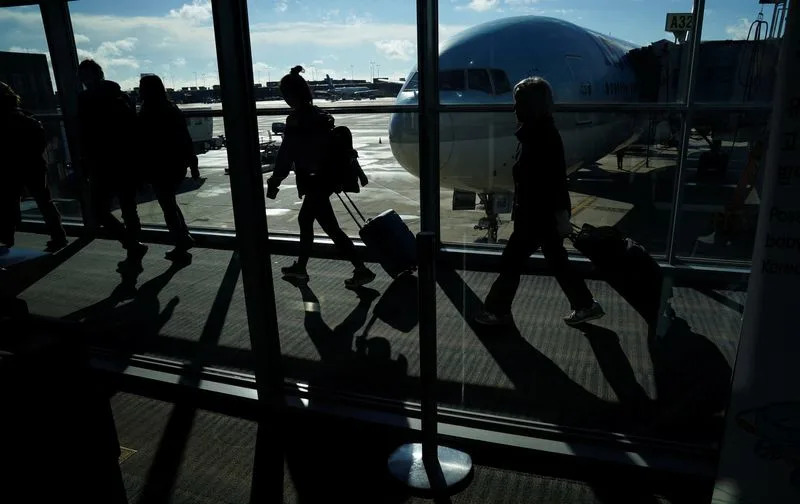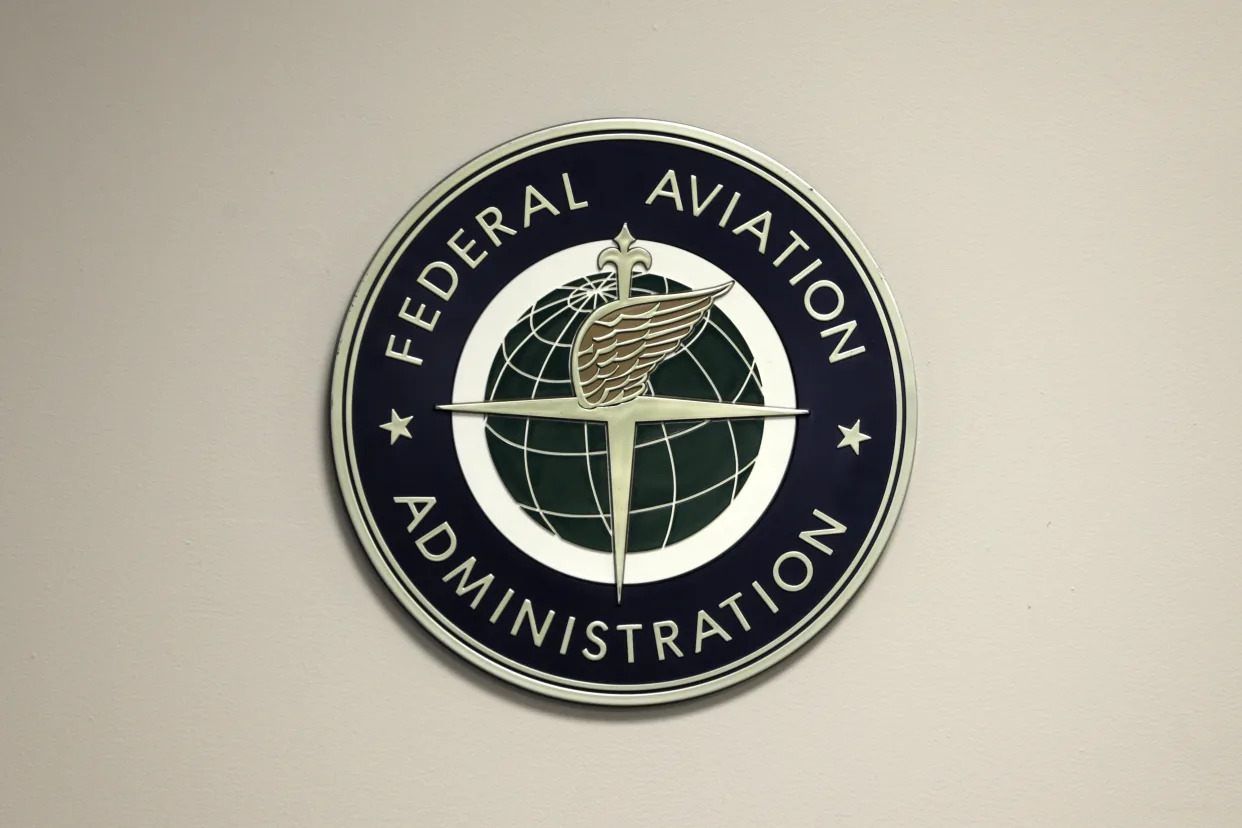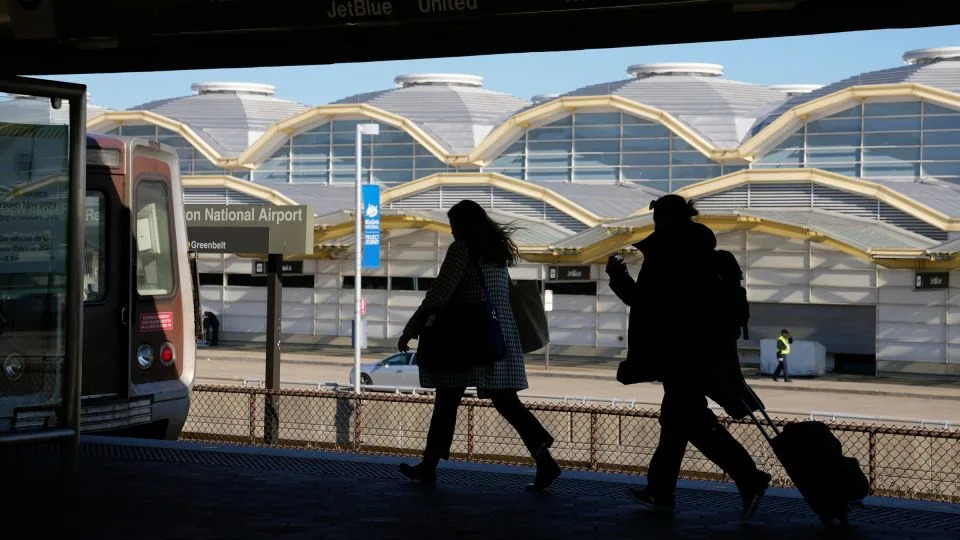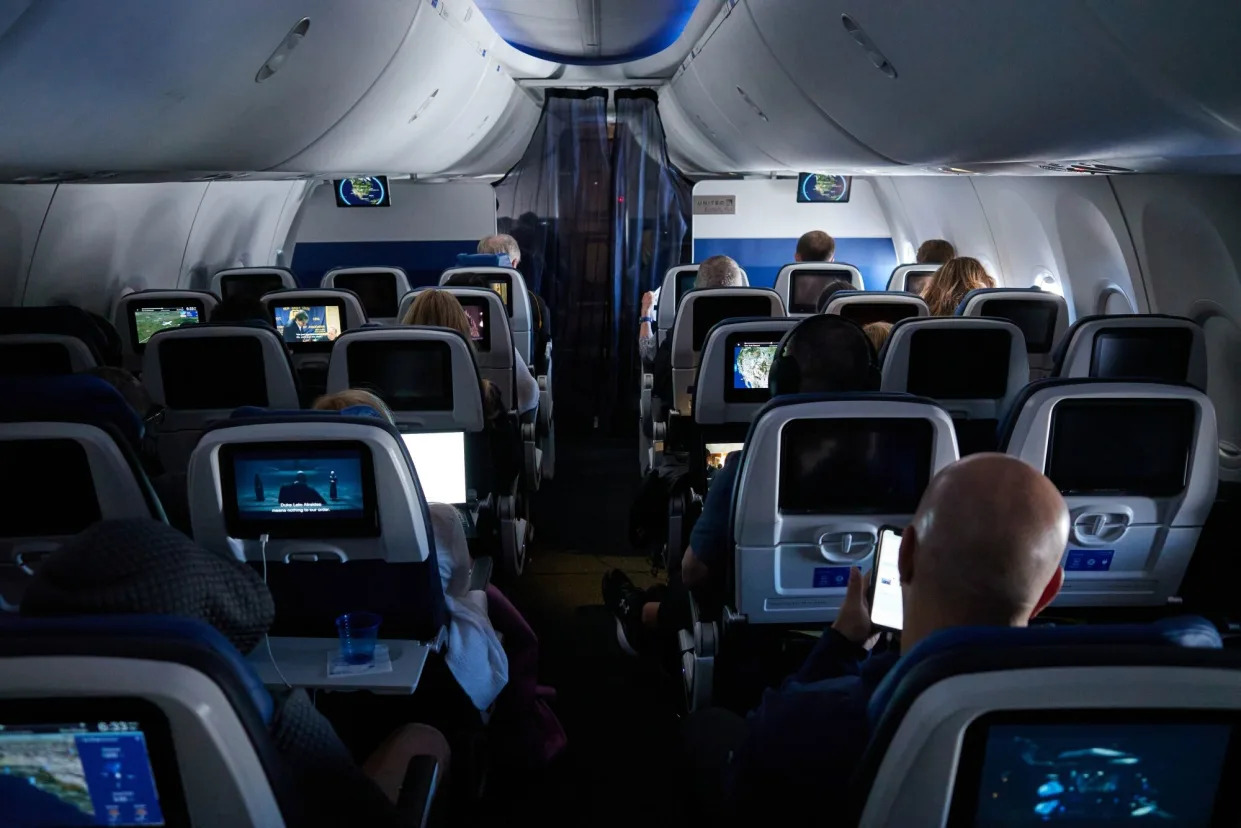Updated Thu, May 16, 2024

Thanksgivng Holiday travel at Washington Dulles Airport in Virginia
By David Shepardson
WASHINGTON (Reuters) -President Joe Biden signed on Thursday sweeping aviation legislation that will boost U.S. air traffic controller staffing, increase funding to avert runway close-call incidents and speed up refunds for canceled flights.
The $105 billion, five-year measure reauthorizes the Federal Aviation Administration. It prohibits airlines from charging fees for families to sit together, requires airplanes to be equipped with 25-hour cockpit recording devices, raises maximum civil penalties for airline consumer violations from $25,000 per violation to $75,000 and boosts aircraft production scrutiny.
"Following flight disruptions, runway close calls and consumer frustrations, this law is set to deliver the safest, most reliable aviation system in the world," said Senate Commerce Committee Chair Maria Cantwell. "Plane manufacturers will see more safety inspectors on factory floors and tougher safety standards from the FAA."
Biden has repeatedly clashed with air carriers, calling for new stricter consumer rules and harshly criticizing them for imposing fees. His administration has also aggressively moved to block further consolidation in the passenger airline industry, including successfully blocking a tie-up between JetBlue Airways and Spirit Airlines and quashing an alliance between JetBlue and American Airlines.
The law also adds five daily round-trip takeoff and landing slots at busy Washington National Airport, which Delta Air Lines had lobbied for. The bill also directs the FAA to deploy advanced airport surface technology to help prevent collisions.
Efforts to boost aviation safety in the United States have taken on new urgency after a series of near-miss incidents, as well as January's door plug mid-air emergency on an Alaska Airlines Boeing 737 MAX 9 flight.
FAA Administrator Mike Whitaker said the bill "allows for more runway safety technology, more air traffic controllers and stronger oversight of aircraft production."
The bill also will allow Boeing to continue to produce its 767 freighter for another five years through 2033 in the United States, giving it an exemption from efficiency rules taking effect in 2028.
The bill aims to address a shortage of 3,000 air traffic controllers by directing the FAA to implement improved staffing standards and to hire more inspectors, engineers and technical specialists.
The bill does not raise the mandatory pilot retirement age to 67 as House lawmakers had sought to do last year and retains pilot training requirements.
Congress will not establish minimum seat size requirements, leaving that instead to the FAA. The bill requires the Transportation Department to create a dashboard that shows consumers the minimum seat size for each U.S. airline.
Lawmakers also rejected many other consumer provisions the Biden administration had sought, including requiring compensation for lengthy airline-caused delays as is the case in Europe.
The bill reauthorizes the National Transportation Safety Board and boosts staffing at the safety investigation agency. It also seeks to boost adoption of drones and flying air taxis into the national airspace and extends through Oct. 1 existing government counter-drone authority.
(Reporting by David Shepardson; Editing by Susan Heavey, Brendan O'Boyle and Jamie Freed)
House signs off on FAA bill that addresses aircraft safety and and refund rights of passengers
DAVID KOENIG
Wed, May 15, 2024

A Federal Aviation Administration sign hangs in the tower at John F. Kennedy International Airport in New York. Congressional negotiators have agreed on a $105 billion bill designed to improve the safety of air travel after a series of close calls between planes at the nation’s airports. (AP Photo/Seth Wenig, File)
Congress gave final approval Wednesday to a $105 billion bill designed to increase the number of air traffic controllers, add more safety inspectors at aircraft factories, and require airlines to automatically pay refunds to travelers whose flights are canceled or significantly delayed.
The House passed the measure to reauthorize Federal Aviation Administration programs by a 387-26 margin and sent it to President Joe Biden. The Senate passed the measure last week.
Supporters called the provisions of the legislation a key step in improving aviation safety after a number of close calls between planes at U.S. airports in the last two years.
“This bill recognizes while our aviation system is safe, we have to continue raising the bar for safety,” said Rep. Sam Graves, R-Mo., chairman of the House Transportation Committee, which produced the first version of the legislation 10 months ago.
The Republicans and Democrats who lead the key aviation committees in the House and Senate negotiated over the bill's final shape last month, then fought off amendments that might have slowed the measure's passage.
One of the most contentious issues turned out to be the addition of 10 long-haul flights a day to and from Reagan National Airport outside Washington, D.C. Lawmakers from Virginia and Maryland tried to kill the provision.
Rep. Donald Beyer, D-Va., said the extra flights would “aggravate dangerous conditions” and cause more flight delays at the busy airport across the Potomac River from the nation's capital. But lawmakers from Western states, including Sen. Ted Cruz, R-Texas, fought for the flights, as did Delta Air Lines.
The final version of the law authorizing FAA and National Transportation Safety Board programs for the next five years checked in at more than 1,000 pages. Congress has been critical of the FAA since it approved Boeing 737 Max jets that were involved in two deadly crashes in 2018 and 2019.
The bill's major provisions include directing the FAA to hire more air traffic controllers and safety inspectors, to increase the use of collision-avoidance technology at airports and to improve access for passengers with disabilities.
It also bans airlines from charging fees to let families sit together and requires them to issue automatic refunds when flights are canceled or delayed for several hours.
Airlines are suing the Biden administration to block a new Transportation Department rule on the automatic refunds, and inclusion of the provision in law could help the administration's legal case. Graves said the issue could lead to higher fares or result in refunds to travelers who would prefer being booked on another flight, but it didn't prevent him from supporting the bill.
House passes Federal Aviation Administration reauthorization bill
Clare Foran, Gregory Wallace, Tami Luhby and Haley Talbot
CNN
Wed, May 15, 2024

The House has passed a major federal aviation bill that aims to improve aviation safety, enhance protections for passengers and airline workers and invest in airport and air travel infrastructure nationwide.
The bill renewing the Federal Aviation Administration’s authority for five years will next head to President Joe Biden to be signed into law. The legislation passed the Senate last week. The House vote was 387 to 26.
The bill would authorize more than $105 billion in funding for the FAA, as well as $738 million for the National Transportation Safety Board for fiscal years 2024 through 2028.
Although the package has drawn broad bipartisan support, it touched off contentious debate over certain policy issues.
One flashpoint centered on a provision to add longer-distance flights at Reagan National Airport, just outside of Washington, DC. A group of Washington-area Democratic senators pressed to strip the provision from the package, though the chamber didn’t ultimately move to do so.
Some lawmakers argue additional flights would give consumers more choices and bring down prices, while others say it would increase congestion and delays at the airport, as well as create safety issues. Lawmakers commute most weeks between their home states and Washington, and many could benefit from more convenient flights back and forth.
Other key provisions of the legislation include:
Wed, May 15, 2024

The House has passed a major federal aviation bill that aims to improve aviation safety, enhance protections for passengers and airline workers and invest in airport and air travel infrastructure nationwide.
The bill renewing the Federal Aviation Administration’s authority for five years will next head to President Joe Biden to be signed into law. The legislation passed the Senate last week. The House vote was 387 to 26.
The bill would authorize more than $105 billion in funding for the FAA, as well as $738 million for the National Transportation Safety Board for fiscal years 2024 through 2028.
Although the package has drawn broad bipartisan support, it touched off contentious debate over certain policy issues.
One flashpoint centered on a provision to add longer-distance flights at Reagan National Airport, just outside of Washington, DC. A group of Washington-area Democratic senators pressed to strip the provision from the package, though the chamber didn’t ultimately move to do so.
Some lawmakers argue additional flights would give consumers more choices and bring down prices, while others say it would increase congestion and delays at the airport, as well as create safety issues. Lawmakers commute most weeks between their home states and Washington, and many could benefit from more convenient flights back and forth.
Other key provisions of the legislation include:
Hiring more air traffic controllers
The bill would require the FAA to hire and train as many air traffic controllers as possible to close a gap of 3,000 vacancies. It would also mandate more research into how many controllers are needed at each tower and center and would increase access to training simulators in more air traffic control towers nationwide.
The bill would require the FAA to hire and train as many air traffic controllers as possible to close a gap of 3,000 vacancies. It would also mandate more research into how many controllers are needed at each tower and center and would increase access to training simulators in more air traffic control towers nationwide.
Improving runway safety
To reduce the number of collisions and near-collisions on runways, the FAA would be required to install additional runway technology at medium and large hub airports.
The technology is only installed at about three dozen US airports, according to the FAA, and played a role in alerting controllers that American Airlines and Delta Air Lines passenger jets were about to collide on a John F. Kennedy airport runway in New York City in January 2023.
Passenger protections
In April, the Department of Transportation finalized a new rule on airline refunds: They’re due in cash – rather than vouchers – within a few days, and come automatically. That means no requirement to call the airline and complain when your flight is canceled or substantially delayed.
The compromise FAA bill as proposed originally did not go as far as the new DOT rule, which raised the possibility that a future DOT leadership could strip the automatic refund rule. After an outcry – including from an alliance of Republican Sen. Josh Hawley of Missouri and Democratic Sen. Elizabeth Warren of Massachusetts – the bill’s negotiators returned to the drawing board and added the automatic component into the bill. Under the new language, if a passenger declines an airline’s rebooking request or does not respond to the request, the airline must issue an automatic refund.
Enhancing protections for airline workers
The legislation would put more teeth behind rules against attacks on aviation workers, which spiked during the Covid-19 pandemic, by expanding legal protections to ground-based employees like gate and check-in agents.
It would also enhance Transportation Security Administration-taught self-defense training for flight attendants so they can better protect themselves and respond to unruly passengers and other threats.
Setting a standard for travel credits
Under the bill, travel credits issued by airlines in lieu of refunds would have to be useable for at least five years.
Increasing cockpit voice recording
Commercial aircraft would have to carry 25-hour cockpit voice recorders under the legislation. That was a top ask of the NTSB and a substantial increase from the current two-hour standard.
The cockpit voice recorder is one of the two black boxes and is currently only required to capture two hours of sound from the cockpit. The NTSB says recordings that would be key to investigations have fallen outside the two-hour window and been overwritten.
Six Ways Congress Plans to Make Flying Better With the FAA Bill
Sana Pashankar
Wed, May 15, 2024

(Bloomberg) -- Congress is aiming to make US airlines quicker to issue refunds and more transparent about their fees.
The House is on the verge of passing legislation to improve consumer protections and flying standards when it comes to buying, boarding and changing flights.
The Senate passed the same measure, a five-year authorization for the Federal Aviation Administration, last week. President Joe Biden is expected to sign the legislation ahead of a May 17 deadline.
Here’s how the reauthorization bill will affect travel:
Automatic Refunds
The legislation would allow passengers to receive full, automatic refunds for flights that are significantly delayed or canceled if the passenger chooses not to take that flight or accept a rebooking, voucher, credit or compensation.
This would apply to domestic flights that arrive three or more hours late and international flights that arrive six or more hours late.
Airline Vouchers
The lifespan of a flight voucher today depends on the airline, but typically these forms of coupons expire one to two years after they’re issued. The FAA bill would require airlines to accept vouchers, airline credits and other forms of flight compensation for at least five years.
Customer Service
In December 2022, Southwest Airlines’ software systems crashed during a winter storm. Millions of passengers across the nation were stranded in airports during the Christmas holiday and faced excessive wait times from customer service and little communication from the airline.
The reauthorization bill requires airlines provide free, 24/7 access to customer service agents by phone, text message, or live chat, partially as a reaction to Southwest’s holiday fiasco. Lawmakers emphasized that these forms of communication should be “without an excessive wait time, particularly during times of massive disruptions.”
Transparent Fees
Seemingly cheap flights can become exponentially more expensive between the ticket purchase and takeoff. The bill would require airlines to clearly show additional fees, such as for checking baggage or changing a reservation, before booking the flight.
Improved Accessibility
The legislation would mandate airlines accommodate specific seating requests for passengers with disabilities, such as a seat near the bathroom or one with more legroom. Airlines would also be required to provide information, upon request and on their public website, about reservations for an on-board wheelchair.
The legislation also would create a grant program to incentivize US airports to upgrade their accessibility standards.
Washington Flights
Perhaps the most contentious component of the bill is one that allows five additional round-trip flights to operate through Ronald Reagan Washington International, the closest airport to downtown DC
Opponents of the measure, including United Airlines and lawmakers from Virginia and Maryland, argue that allowing more flights would worsen delays and noise pollution, along with potentially jeopardizing passenger safety.
Proponents of the measure include lawmakers who live in states further from DC and want more convenient and frequent ways to travel home. Delta Airlines, which argued that the airport is underused, is also in favor of the expansion.
Bloomberg Businessweek
No comments:
Post a Comment